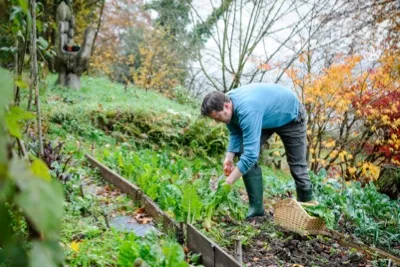The Vegetable of the Year Awards 2013
The leaves are fading and falling, the veg bed is looking depleted and so is my enthusiasm for veg growing. In the seven years that I’ve been growing veg, I always find myself almost fed-up of weeding, slugging and harvesting by this time of year.

I think this is something many growers feel at this time of year. Time for a winter break, a hearty feast and then a gathering of thoughts in the new year. By the end of January, I’ll be ready for action once again.
But now feels like a good time to look back at the first full year of veg growing on our Welsh hill and see what worked and what didn’t. And one lucky vegetable will be crowned vegetable of the year…
In chronological order:
Winners!
Purple sprouting broccoli – though you have to plant the seeds the previous April and it’s hard work keeping the butterflies off them all through the unproductive summer, purple sprouting repays all of this the following March and April. This year was a bumper harvest at a time when we had little else to eat from the garden.
Broad beans – a fabulous crop this year – we almost tired of them and are still eating those we blanched and froze in July. And barely any blackfly, possibly due to our altitude. But so very, very late this year. We have already sown 'aquadulce' variety this autumn in the hope of an early spring crop. Cue snow.
Chard – a massive glut from July to November and still cropping. Tasty stuff and a must have though seedlings must be started in greenhouse. Again, we froze a couple of kilos to enjoy in the dark months.
Peas – plentiful and delicious though I still need to find a simple, effective and reusable method of supporting them rather than random sticks and string.
Potatoes – only the waxy varieties were worth bothering with. Duke of York and Wilja were the best – utterly delicious. The floury potatoes were no better than shop bought and were very scabby
Lettuces – abundant – too many at times. Cos lettuces proved the tastiest and most resistant to slugs. Not so keen on the floppy oak leaf types.
Beetroot (bolthardy) – another winner but only after we’d reared seedlings in the greenhouse. Enough for pickling too.
Salsify – despite my creating a special sandy raised bed, these still turned out a bit knotted and hard to peel. Lots of effort for little result, though very tasty.
Turnips – a surprise winner. Lots of big and tasty neeps but many were riddled with tiny slugs.
Garlic – brilliant. Every bulb planted produced a new one. A revelation. And so easy.
Perpetual spinach – plentiful but outranked by more delicious chard. A useful crop to have for use in veg curries and other spinachy dishes.
Also rans…
Runner beans – poor this year. Pests and old seeds amounted to a very small crop.
Borlotti beans – failed dismally. Same for French beans
Cabbages – a disaster. Almost all were devoured by caterpillars of white butterflies.
Black kale – mildly better than other cabbages but mostly destroyed by caterpillars. Those that survived might produce an early winter crop.
Spinach – as usual, bolted before being any use.
Khol rabi – an experiment that was ruined by caterpillars
Growing but not ready yet category:
leeks, mooli, Chinese cabbage and pak choi.
As for the very best veg of the year, the winner is
white Duke of York potatoes.
Everyone who tasted them was astonished that potatoes could have such a rich, buttery flavor. And they were easy. Throw them in, watch them grow, dig up the buried treasure.
Silver medal: purple sprouting. So delicious steamed then drenched in butter.
Bronze: chard. Indefatigable, delicious and offers two distinct dishes – the leaves (wilted like spinach) and the stems (lovely braised in chicken stock!).
I'm pretty satisfied with the first year. Looking back I would certainly put more effort in protecting all the brassicas in 2014, and plant more Duke of York potatoes. And be kinder to the climbing beans.

